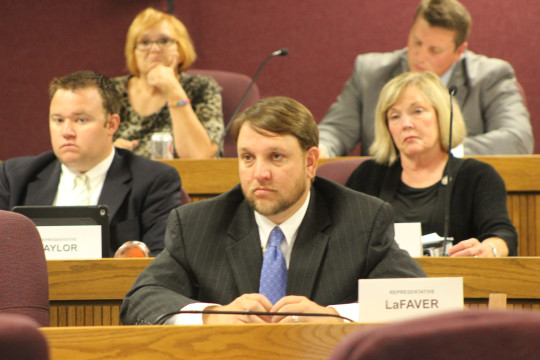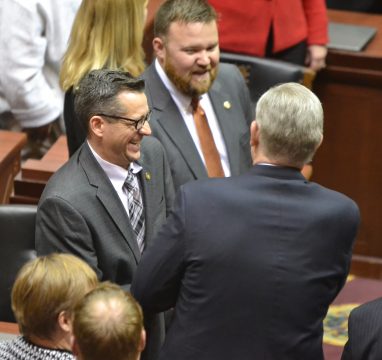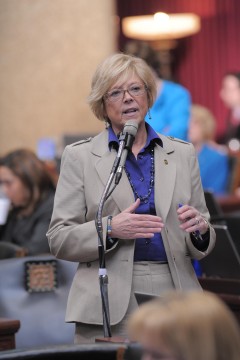Five legislators from the House of Representatives recently spoke with the Missouri Times about their final terms of office and the experience of holding office. Reps. Jeremy LaFaver, D-Kansas City; Linda Black, R-Park Hills; Ron Hicks, R-St. Peters; Anne Zerr, R-St. Charles; and Mike Colona, D-St. Louis City are all either term-limited, looking forward to different elections or simply stepping away from politics. These are their thoughts from their time in the House.
The Missouri Times: What do you think is the most important thing you’ve learned as a legislator?
LaFaver: There’s so many really important things. Specifically as a legislator, I think probably the realization that in a better way that this process or life generally, is a marathon and not a sprint. I think early on I was a lot more reactionary and quick to react to something that’s going on, and I think now as the years have worn on, I think I react less quickly and realize there will be another day.

Black: Just how interwoven the state is with so many different entities across the state back in our home districts ranging from boards dealing with the developmentally disabled, health centers, schools, hospitals, you name it, the state has a presence through legislation in just about every sector and every facet of life. That makes this job even more important than I had imagined at the beginning.
Hicks: The most important thing I learned as a legislator is balancing. How to balance my home life versus this life, how to balance friendships you have in the building. Politics is like a road map. There’s thousands of roads to get to where you need to go, but it’s the avenue that you choose. Especially never being in politics before, never holding office, and then coming up and getting a crash course by people, like my friends Tom Smith, Tim Jones, Doug Funderburk, Anne Zerr and people like that, was very eye-opening, but the one thing I take back with me the most is just actually learning how the system works.
I know people follow politics and this and that, but I really don’t think they have any clue of how the inner workings of things work. They always point the finger at lobbyists and think the lobbyists run the show, and that one still gets to me because there’s no lobbyist in the building that could buy me anything that would change my vote. I would have to say juggling.
Zerr: I think the most important thing that I’ve learned is that nothing is black and white. There are so many different facets to every public policy issue and question that you really need to step back and take a look at the whole big picture and the global perspective and how important our role is in the future of Missouri.
Colona: Don’t automatically assume just because someone is in a different party that they won’t agree with you on issues. Not every Republican is the same, not every Democrat is the same, not every district is the same. Remember when you walk through the doors, as an elected official, sometimes your party identification doesn’t matter. It’s really the issues that matter, and you’ll find folks on the other side of the aisle that agree with you or on some of your issues and you’ll be able to work together with them on it.
TMT: What is a particularly trying time you had to go through as a member of the House?

LaFaver: I think last year was really difficult. Overall, with the tragedy of the auditor and members of his staff and then with the issues we had in the House and the Senate and other issues that popped up, it was a very difficult time for me to appreciate what I was up to down here, and it made me long to be home much more than I could be. It was a tough year.
Black: My eight years here has actually been a wonderful experience. I came in knowing exactly who I was as a person, what my beliefs were, what my district dynamics were, so I always stuck to my instincts on how to vote for my district, and that never put me in a compromising position. I never flipped on votes. I just knew I was here to represent my citizens, and so that made it easy. Really, I would have to say the entire experience has been a wonderful one, and one that I am very gracious to have been able to do.
Hicks: Learning how to balance my friendships. When I entered the building and when they left or I’m leaving, the hardest thing is keeping the friendships when you make votes. Right-to-Work. Perfect example. Being a Republican representing the district that I do, but that means having friends that are so anti-union and then being on the pro-union side, that’s the hardest thing right that. Friendships were hurt, feelings were hurt. I still feel that way, honest to god. I still feel feel that some of the friends I made here that we were real close that first year in office, but then after I took that vote that second year, it’s the hi, and the handshakes or something in the hallway, it’s not the “What’s up!” or the high fives or “Let’s go out and have a drink.”
You lose sleep over things like that because you lose friends, you disappoint people. I thank god I’ve been able to repair some of those like with Tim Jones and Bob Onder because let’s face it, the building is politics, but outside of that, they’re still our friends and we want them to remain that way. I don’t care what anyone thinks or how that person votes or what they do politically to hurt someone else or a group…
Bob Onder, perfect example. Some people don’t like that I’m friends with him in some cases because of the way he is with the labor issues and stuff like that. But that’s this building. That’s not the way it is outside this building… I’m not just pointing him out, there’s others that are the same. There’s friends that I’m still close with right now that we can disagree with, and it doesn’t hurt our relationship. I wish people could understand that.
Zerr: It was really difficult to try to work to get some tax credit reform because we can’t just cut the whole program off although they do need to be amended, adjusted. They need to give a positive return on the state’s investment. I worked on that for two or three years and we never could quite… one side wanted to get rid of tax credits completely, especially the two largest programs, and then the other side didn’t want any change at all. But I thought taking a realistic look at the data and a return on the state’s investment, that we could make adjustments and reasonable changes in it, and they couldn’t agree with that. They couldn’t compromise so the result was that we had the status quo and nothing got reformed. I think it’s all about compromise here and reasonable public policy development.

Colona: I would say it really took almost my entire eight year tenure to believe that even when you have facts on your side, the law on your side, common sense on your side, with some folks, it doesn’t matter, and they will vote against their own interests, that facts, reality, common sense, sometimes don’t matter. I mean, after all, Illinois’ economy is in the toilet because they have laws that prohibit discrimination against gays (I think your paper actually printed that). I’m not going to agree or disagree with that, but where is the empirical data? That defies common sense, but I do believe the Senator truly believes that, and that’s okay. That’s his prerogative.
But that’s just one example of how over the years, you can point to certain outcomes in say the criminal justice system that are outcomes specifically because of the laws we passed. And when we highlight some of that stuff, like take juvenile life without parole for example, the US Supreme Court has told us that our law is unconstitutional and we need to fix this. Four years later and we still haven’t fixed it. And who knows why, but we still can’t fix it. Common sense would say “For crying out loud, these are kids. Our Supreme Court said we are denying their constitutional rights. Fix it.” But here we are, three or four years later down the road, we haven’t fixed it.
TMT: What do you think was an achievement from your four years down here?
LaFaver: In the legislative process when you’ve got 197 people, it’s hard to claim credit for anything. There are a lot of people who do great work. I think the work I did on the budget committee for children and for families, some of the bills we advanced, whether they passed or not, I think we added to the conversation that was important. But in my line of work, as a member of the super minority party, largely what I get to do is play defense. I think in large part we were successful in doing some of those things.
Black: My first year here, the committee I served on, the public safety committee, we did the line of duty death benefit in the state of Missouri. We were one of the only states that did not have a line of duty death benefit for members of law enforcement and firefighters that died in the line of duty. Now we do. That was a big accomplishment. There are just so many. When you’re passing hundreds of bills a year, you’re instrumental in every step of the process, but that one comes to mind. Expanding the Heroes Way Interchange Program, so that we can name local fallen heroes that served in Iraq and Afghanistan. I passed that legislation a few years ago, so now other representatives in smaller communities can name interchanges after those fallen soldiers.

Hicks: The understanding that this building brought to my family. It will wake a man or woman up. You leave your family at home and you come up here to do this and that’s easy to do, it’s a job. I only live an hour and a half away from the building, the hard part though is that separation time and realizing that this building doesn’t need to come home with you, to your personal life. That was very eye-opening.
It brought my wife and I closer. We did have a problem, there was a time where it got a little bit rough with me being up here and I lost track of home.
Zerr: Two things. One was a bill that I carried as a sophomore to tighten up the laws on human trafficking and make it easier to catch the big guys, the pimps, rather than the victims, who sometimes are prostitutes. We also called for education of law enforcement to see the signs of that.
The second one is the Boeing bill. I was lucky enough to carry it. And it’s really cool when everybody works together, the House, the Senate, labor, the governor’s office, we all knew we needed to come together to develop a package that would be attractive to Boeing to build the 777X here. We were in contention with a couple other places across the country, but that was an example when business, labor, the legislature and the executive branch came togeher and it worked. And ultimately, we do have part of the wing here that’s now being built.
Colona: Well, some people may consider it my biggest fault, but I know just by being here I’ve moderated people on a lot of issues. I’ve had a number of folks in both parties over my tenure say, “Hey look, I never knew a gay person, and you’ve completely changed my point of view. It’s not that I had a bad point of view, I just didn’t know anyone and it really humanizes that side of the issue.”
Weirdly enough, it’s the same way with a lot of legal issues. A lot of folks don’t know about the practice of law or how when push comes to shove what we do here affects people with how much time, money or energy they have to spend to comply with laws or when they hear about some of the old sentencing options that were available for a first-time screw-up or a college kid, they’re just amazed. And I’ve been able to educate folks over the years in regards to what the letter of the law says. Sometimes in practice, it is executed differently, and because it’s executed differently, perhaps we need to go back and revisit some of those laws we passed and tweak them and do what we actually intended for them to accomplish.
TMT: What is something you’re going to miss about the House?
LaFaver: I really love being on the floor. I love sitting with my colleagues and talking to them. I like that we feel insulated and somewhat protected from the pressures of the hallways, and people of the hallways, and (no offense to you but) the media. And we can sit there and we can talk to each other about a real thing or family or whatever, and then when the action’s happening, there’s so many exciting new things to watch and understand about who’s talking to who, what motions are being made… It’s just a very unique, interesting, fascinating, fun place to be.
Black: I’m just going to miss the relationship with my colleagues, I’m going to miss having the ability to really intervene in a large capacity on behalf of my constituents to make sure government is working for them.
Hicks: The fast pace. This keeps you alive, this keeps you going. I turn 44 here in May and it keeps you young and motivated but it also keeps you focused on the things that are important in life and what’s going on in your community and in your state. I’m going to miss that, because now I’m going to have find myself watching news channels, which I don’t like to do. I’m going to have to be an internet junkie, which I’m not. That’s going to be the hardest thing to break away from is the politics side of it…
I would encourage anyone who’s thought about doing something like this, to do it. Even the experience of learning to run your own campaign, even if you don’t win, you will grow 100 times. It changes you, it really does.

Zerr: I think I’ll miss not only having made a lot of friends, but I have 163 different points of view. Everybody has a different experience in life, skill set and opinion and that makes us even more effective if we listen to these 163 people.
Colona: The collegiality. Everyone here is here for the right reasons. They want to help people. They want to fix problems. They want to find out the best way to either help or get out of the way of everyday folks that just want to put food on the table and enjoy their family. And southwest Missouri is a heck of a lot different than South Central St. Louis City and embracing those differences and respecting those differences and talking about those differences, that’s really going to be something I’m going to miss. On a lot of these urban issues that I try and work on, it’s not that folks in the majority party, or even Democrats from rural areas, don’t agree with me. It’s that they’re ignorant, in the true sense of the term “do not know,” the issues that affect urban neighborhoods. What I enjoy doing is in essence exposing folks to that and explaining why it is an issue. And by the same token, Rep. Rhodes from the deep south of Missouri will spend an hour or two explaining to me an issue that occurs in West Plains, I’ll scratch my head and say, “Well, why is that an issue?” It’s not an issue in my neighborhood, but it is an issue for him. To educate some of my colleagues from the rural areas, that’s what I’m going to miss.
My fear is with the era of term limits and more importantly, the era of consultants driving races, elections, and the fear that is being instilled in folks coming into office nowadays, that if you’re not the most extreme of the extreme, you’re going to get a primary, you’re not coming back, a lot of that is creeping into the system that I think in the long run is really negatively affecting the process here.
TMT: What’s a piece of advice you would give to someone who would want to take over your seat?
LaFaver: The best piece of advice I can tell somebody is to recognize that while you may not agree with somebody on the other side of the aisle or even somebody in your own party, it’s important to remember that 35,000 people represented them to likely do what they’re doing or saying at to at least recognize that or have an appreciation for it. I think that allows us all to work a little bit better together. If I have any regrets, it’s probably that that lesson wasn’t learned for me until probably this year, and that I took things and aimed things at people more personally than needed to be done.
Black: One is always put your own conscience first when it comes to your decision making, so that way every night you go to bed, you can always speak peacefully knowing that you stuck to the core values of who you are. Second is remember your constituents who have sent you here. It is for them that you make decisions. It’s for their best interests. You’re here to represent the common people that have sent you to Jefferson City. And also to always be attentive to constituent needs. Oftentimes, we get sidetracked by the legislative process, thinking it’s all about passing bills, when really it’s about making sure the state government works for the people that have sent you here and to always be attentive to their needs, their interests and being able to assist them with issues that impact their daily lives.
Hicks: If I can give anyone advice… I don’t care if you’re retired and your children are grown and gone, but if you have someone at home, make sure you keep your home life your home life and you never neglect the fact that you have a family at home. Because without this, you have them, but without them and this, what do you have.
If I accomplished nothing in my four years, I’ve made some great friendships, I’ve met a lot of nice people, I’ve met people throughout this state that have touched my heart, and I was able to save a young lady’s life right there. To be here at that particular time, maybe if I accomplished nothing here, but that’s the reason God had me here is that one moment in life where you’re able to say someone’s life and change their life forever.
Zerr: Study hard, trust your gut, keep in touch with your constituents to hear what they’re feeling, and be able to really articulate to your colleagues and your constituents why you made the decision you did. But the most important thing is study hard. And keep your head. Don’t get a big head.
Colona: Two things. Thing number one: I would say again, don’t assume just because someone’s from a different party that they don’t agree with you or they won’t help you or work with you on your issues.
And there are very, very few issues that are so important, that are so basic, that you can’t come off… In other words, you can negotiate and give on issues without surrendering your principles. So you can be extremely principled, and work with other folks and give in on the edges in order to move things forward. I’ll give an example, you talk about gun rights. It seems to be an either/or in the building. But in reality, it really shouldn’t be an either/or. I mean, is the question really do we have a Second Amendment right? No, we don’t disagree on that. The question becomes who has the right to possess a firearm and when and where. As Democrats, sometimes we’ll jump up and down and scream, “Oh my God, one more gun and society will come to a grinding halt,” and it’s been proven that it hasn’t. On the flip side, I would hope that my colleagues would sometimes pay deference to the argument of local control and maybe municipalities should be allowed to prohibit guns at a daycare center or at a school.
But we get so entrenched in our way or the highway, 99 times out of a 100, it’s a losing argument. And you can still retain your principles by negotiating for good public policy.









